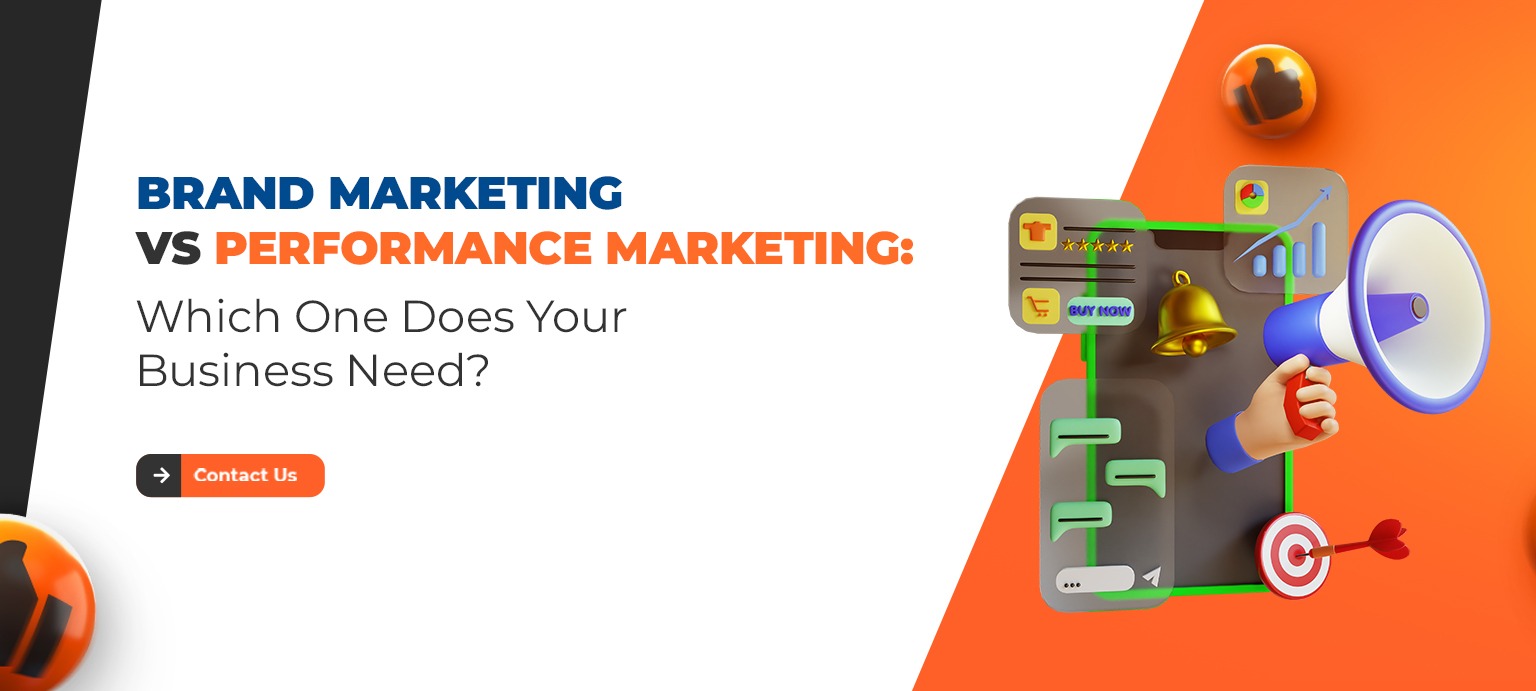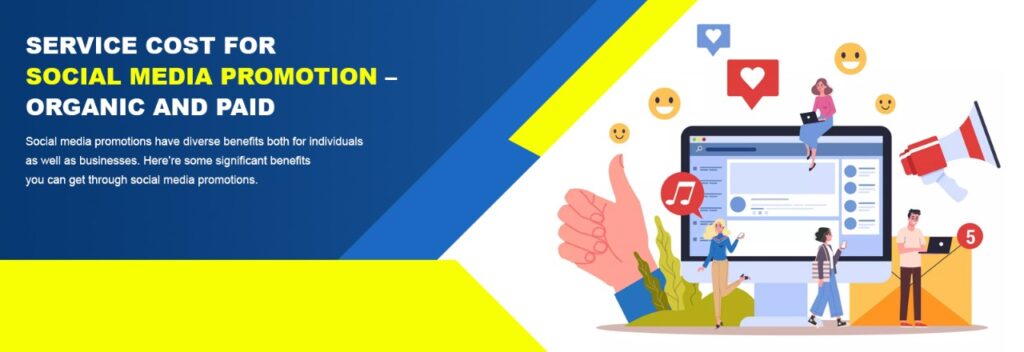When it comes to marketing, businesses are often faced with a crucial decision: Should they focus on brand marketing or performance marketing? Both strategies have their own strengths and serve different purposes. Understanding the difference between brand marketing and performance marketing can help you choose the best approach for your business. This blog will break down both types of marketing, their differences, and how to determine which one fits your business needs.
What is Brand Marketing?
Brand marketing is all about building the identity and reputation of your business. The primary goal is to create a lasting impression on your audience and foster a sense of loyalty. Brand marketing focuses on long-term growth by consistently delivering a message about what your business stands for, its values, and what makes it unique.
Key aspects of brand marketing include:
Building Awareness: The aim is to ensure that people know your brand exists. This involves getting your brand’s name out in front of potential customers through various channels like TV ads, social media, and content marketing.
Creating Emotional Connections: Brand marketing strives to build trust and emotional bonds with consumers. It’s about more than just selling products or services – it’s about making customers feel connected to your business.
Establishing Brand Loyalty: Once customers become aware of your brand and connect emotionally, the goal is to turn them into loyal advocates who keep coming back for more.
What is Performance Marketing?
Performance marketing, on the other hand, is all about achieving specific, measurable outcomes. It is a results-driven approach where you pay for actions such as clicks, conversions, or sales. Performance marketing typically involves digital marketing tactics like pay-per-click (PPC) ads, social media advertising, search engine optimization, and email marketing.
The key components of performance marketing include:
Measurable Outcomes: Performance marketing is centered around achieving specific goals. This could be generating leads, increasing website traffic, or making sales. Because the results are measurable, it’s easy to track the effectiveness of campaigns.
Pay-for-Action Model: You only pay when a customer performs a specific action, such as clicking on an ad or making a purchase. This makes it a cost-effective option, as you’re only paying for actual results.
Short-Term Focus: Unlike brand marketing, which focuses on long-term relationships, performance marketing is often more immediate. You can see results quickly and adjust campaigns in real time to improve performance.
Performance marketing works well for businesses that need quick results. It’s a great way to generate immediate leads, drive sales, or boost web traffic. E-commerce brands, service providers, and local businesses often rely on performance marketing strategies to achieve their goals.
The Difference Between Brand Marketing and Performance Marketing
Now that we’ve covered both approaches, let’s dive deeper into the difference between brand marketing and performance marketing.
1. Objective
• Brand Marketing: The primary objective is to build a strong, recognizable brand that people trust and feel connected to. Brand marketing aims to create awareness and loyalty, which pays off over time.
• Performance Marketing: The main goal of performance marketing is to drive immediate results like clicks, leads, or sales. It focuses on short-term actions that can be measured and optimized.
2. Time Frame
• Brand Marketing: Brand marketing takes time to show results. It requires consistent messaging and a long-term strategy. The impact may not be immediately noticeable, but over time, it helps to solidify your brand’s presence in the market.
• Performance Marketing: Performance marketing offers quick feedback. You can track the results of your campaigns in real time and make adjustments to improve their performance.
3. Measurement
• Brand Marketing: The effectiveness of brand marketing is harder to measure directly. While metrics like brand awareness, customer sentiment, and loyalty can be tracked, they may not show immediate results.
• Performance Marketing: One of the main benefits of performance marketing is that it’s highly measurable. You can track specific metrics like conversions, clicks, and return on investment (ROI), making it easier to understand the success of your campaigns.
4. Cost Structure
• Brand Marketing: Brand marketing often involves higher upfront costs due to the need for long-term campaigns across multiple platforms. These campaigns might include TV commercials, sponsorships, and content marketing.
• Performance Marketing: Performance marketing tends to have a more flexible cost structure. Since you only pay for specific actions, it can be more affordable, especially for businesses with a limited budget. You can scale your campaigns depending on the results you see.
When Should You Use Brand Marketing?
Brand marketing is ideal if your business is looking to build long-term awareness and loyalty. It’s the right choice for companies that want to create a lasting presence in the market. If your business is a startup, entering a competitive market, or trying to create a unique identity, brand marketing can help establish your brand’s foundation.
Here are some scenarios where brand marketing might be a good fit:
• New Businesses: If your business is just starting out, brand marketing can help you introduce your brand to potential customers and create trust.
• Consumer-Focused Businesses: Businesses that cater directly to consumers often rely on brand marketing to create a strong, lasting connection with their audience. If your business offers consumer products or services, brand marketing can help establish trust, build recognition, and drive long-term success by creating an emotional bond with your target audience.
• Luxury Goods: High-end brands often focus on brand marketing to convey exclusivity, quality, and prestige. Building brand loyalty is critical in these industries.
When Should You Use Performance Marketing?
Performance marketing is a great choice for businesses that want quick results and need to drive specific actions. If your business has clear, measurable goals, such as increasing online sales or generating leads, performance marketing can help you achieve those goals efficiently.
Here are some scenarios where performance marketing might be a good fit:
• E-commerce Businesses: If you run an online store, performance marketing can help drive traffic to your website and convert visitors into customers.
• Service Providers: Service-based businesses like law firms, real estate agents, or digital marketing agencies can use performance marketing to generate leads and acquire clients.
• Local Businesses: If you own a local business, performance marketing can help you target customers in specific geographical areas, driving foot traffic or online inquiries.
Performance marketing is perfect for businesses looking to generate immediate results. By focusing on specific actions, you can easily track performance and optimize your campaigns for better ROI.
Can Brand Marketing and Performance Marketing Work Together?
Understanding the difference between brand marketing and performance marketing doesn’t mean you have to choose one over the other. In fact, the two strategies can work together seamlessly. Combining brand marketing and performance marketing allows you to build long-term brand loyalty while also driving immediate results.
Here’s how they complement each other:
• Brand Marketing Builds the Foundation: By building brand awareness and loyalty, brand marketing lays the groundwork for future performance marketing campaigns. Once your audience recognizes and trusts your brand, they’ll be more likely to convert when they see your performance marketing efforts.
• Performance Marketing Drives Action: While brand marketing creates awareness, performance marketing drives conversions. You can target your most interested audience with tailored campaigns that encourage them to take immediate action.
By integrating both strategies, you can create a balanced marketing approach that focuses on both short-term results and long-term growth.
How to Choose the Right Strategy for Your Business
Choosing between brand marketing and performance marketing ultimately depends on your business goals. Here are some questions to ask yourself when making the decision:
• What are your objectives? If you want to build long-term awareness and trust, brand marketing is the way to go. If you need quick sales or leads, performance marketing is the best choice.
• What is your budget? Brand marketing often requires a larger budget for long-term campaigns, while performance marketing is more flexible and cost-effective.
• What is your timeline? Brand marketing takes time to show results, while performance marketing offers immediate feedback and quick adjustments.
Final Thoughts
The difference between brand marketing and performance marketing comes down to your business goals, budget, and timeline. Brand marketing helps build awareness and loyalty over the long term, while performance marketing drives immediate, measurable results. Both strategies can work together to create a well-rounded marketing plan that supports both short-term growth and long-term success. Understanding your goals and choosing the right marketing approach will help you achieve the best results for your business.
If you are looking for a trusted partner to help your business grow, HTSM Technologies is here to support you every step of the way. We offer a wide range of services, including Digital Marketing (Search Engine Optimization, Pay-Per-Click Advertising, and Social Media Marketing), Web Design & Web Development, Mobile App Development, and much more to help your business thrive in the digital world.
At HTSM Technologies, we take the time to understand your unique business goals and challenges. Our expert team works closely with you to develop customized strategies that align with your objectives and deliver measurable results. Whether you’re aiming to increase your online visibility through powerful digital marketing campaigns, build a user-friendly website that attracts and engages customers, or create an innovative mobile app to enhance user experience, we have the expertise to bring your vision to life.
Our focus is on driving growth and creating solutions that make a real difference. By combining creativity, technical expertise, and a deep understanding of the market, we ensure your business not only meets its goals but exceeds them.
Let HTSM Technologies be your partner in success. Contact us today, and together, we’ll take your business to new heights while leaving a lasting impact in your industry.





